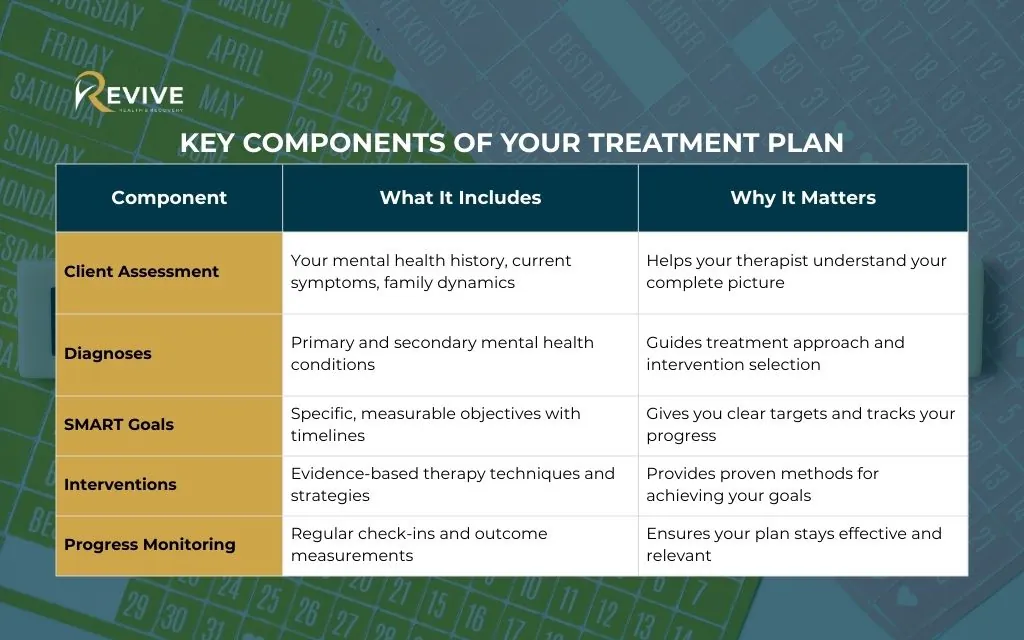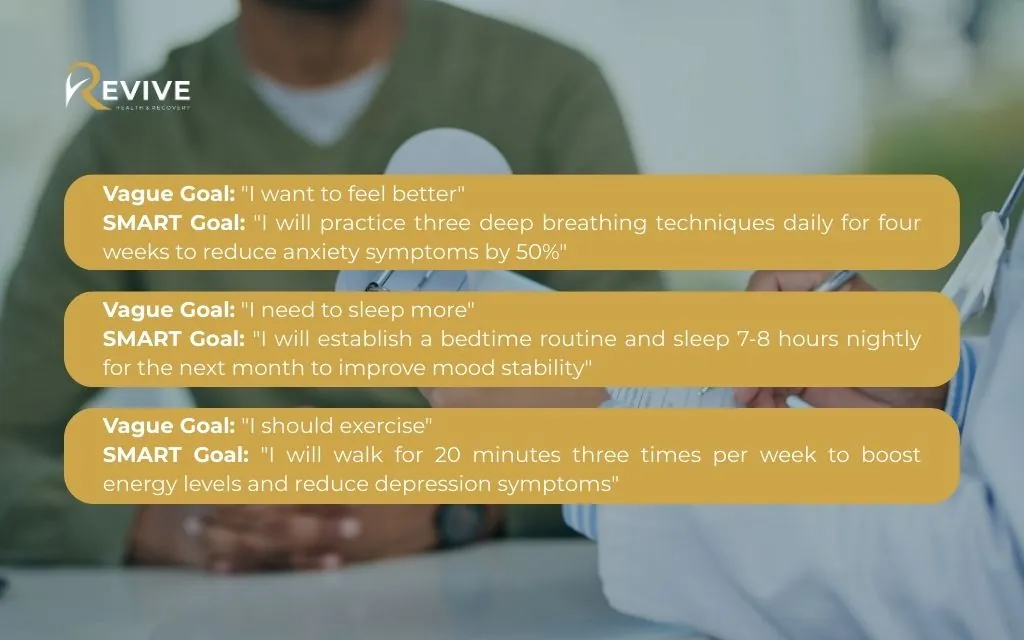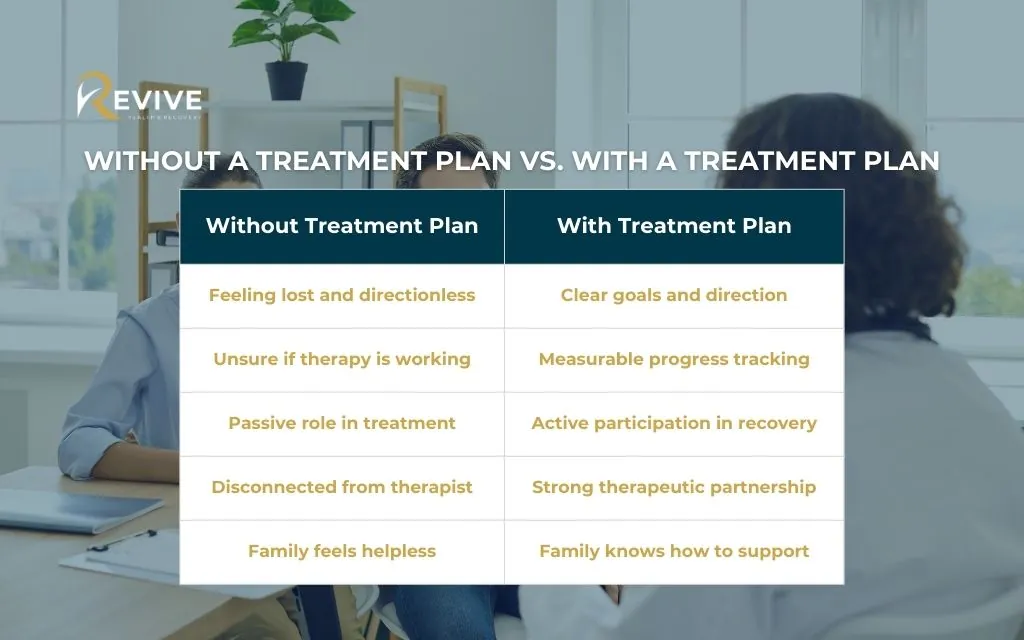Starting mental health treatment feels overwhelming. You wonder what to expect, how the process works, and whether you’re making the right choice. A mental health treatment plan removes that uncertainty. This personalized document becomes your roadmap to wellness, outlining specific goals and steps toward recovery.
What is mental health treatment plan exactly? Think of it as your GPS for mental wellness. Just like you wouldn’t drive to an unfamiliar destination without directions, you shouldn’t navigate recovery without a clear plan. In Colorado, these comprehensive documents go beyond simple paperwork. They’re collaborative tools that empower you to take charge of your healing journey.
Whether you’re dealing with anxiety, depression, trauma, or other challenges, understanding how treatment planning works helps you make informed decisions about your care. This guide walks you through everything you need to know about mental health treatment plans, including Colorado-specific requirements and how to get started with professional support in the Denver area.
Core definition and purpose of treatment planning
What is mental health treatment plan? A mental health treatment plan serves as a structured, personalized document that outlines your clinical needs and therapeutic goals. Under Colorado’s Behavioral Health Administration (BHA) regulations, this document is required for all outpatient mental health services. But it’s much more than a legal requirement.

Your treatment plan creates a collaborative framework between you and your therapist. Together, you identify challenges, set realistic goals, and choose evidence-based interventions that match your unique situation. This partnership approach ensures you remain at the center of your recovery process.
Key Components of Your Treatment Plan
| Component | What It Includes | Why It Matters |
| Client Assessment | Your mental health history, current symptoms, family dynamics | Helps your therapist understand your complete picture |
| Diagnoses | Primary and secondary mental health conditions | Guides treatment approach and intervention selection |
| SMART Goals | Specific, measurable objectives with timelines | Gives you clear targets and tracks your progress |
| Interventions | Evidence-based therapy techniques and strategies | Provides proven methods for achieving your goals |
| Progress Monitoring | Regular check-ins and outcome measurements | Ensures your plan stays effective and relevant |
Ready to start your recovery journey? Contact Revive Health Recovery at (303) 268-4655 to learn how our collaborative approach can help you develop a personalized treatment plan that works.
Colorado’s unique approach to mental health treatment planning
Colorado takes mental health treatment planning seriously. The state’s Behavioral Health Administration, established July 1, 2022, created comprehensive behavioral health safety net standards that benefit everyone seeking care. These specific documentation requirements and compliance standards ensure you receive quality treatment that meets medical necessity criteria.
The mental health treatment plan requirements Colorado has established integrate with the state’s CIBH+ model for whole-person care. This approach recognizes that mental health doesn’t exist in isolation. Your treatment plan considers how mental wellness connects to your physical health, social relationships, and life circumstances.
Colorado BHA Timeline Requirements
- Day 1: Begin biopsychosocial assessment
- Within 14 Days: Complete treatment plan development
- Every 30 Days: Monitor progress and document outcomes
- Every 90 Days: Comprehensive plan review and updates
- As Needed: Plan modifications based on progress
Regular review and update requirements keep your plan current and effective. Your therapist will coordinate with multidisciplinary care teams when needed, ensuring all aspects of your wellbeing receive attention.
The treatment planning process from start to finish
Mental health treatment planning near me begins with a comprehensive initial assessment. Your therapist conducts a biopsychosocial evaluation that examines your mental health history, current symptoms, family dynamics, social supports, and life stressors. This thorough review identifies your strengths, challenges, and available resources.
Your Treatment Planning Journey
- Week 1: Initial assessment and biopsychosocial evaluation
- Week 2: Treatment plan development and goal setting
- Week 3-4: Begin implementing interventions and strategies
- Month 2-3: Regular progress monitoring and plan adjustments
- Month 3: Comprehensive plan review and goal updates
The collaborative goal-setting process happens next. You work with your therapist to develop SMART goals that are Specific, Measurable, Achievable, Relevant, and Time-bound.
SMART Goals: From Vague to Clear

- Vague Goal: “I want to feel better”
SMART Goal: “I will practice three deep breathing techniques daily for four weeks to reduce anxiety symptoms by 50%” - Vague Goal: “I need to sleep more”
SMART Goal: “I will establish a bedtime routine and sleep 7-8 hours nightly for the next month to improve mood stability” - Vague Goal: “I should exercise”
SMART Goal: “I will walk for 20 minutes three times per week to boost energy levels and reduce depression symptoms”
How to get mental health treatment plan services starts with finding the right provider. Look for licensed professionals who emphasize collaboration, have experience with your specific concerns, and create a safe, supportive environment.
Individual versus family treatment approaches
Not everyone needs the same type of mental health treatment plan. Individual therapy treatment plans focus on your personal goals and challenges. These personalized approaches work well when you’re dealing with depression, anxiety, or trauma that primarily affects you.
Family-centered behavioral health treatment plans address systemic issues that impact multiple family members. Addiction, major mental illness, or significant life changes often affect entire families. These coordinated care models ensure everyone gets the support they need.
Some situations benefit from combined approaches. Your individual goals might include improving communication skills, while family goals focus on rebuilding trust and establishing healthy boundaries. Your therapist helps coordinate these different aspects of your care.
Revive Health Recovery specializes in both individual and family approaches to mental health treatment planning Denver residents trust. Our experienced team understands how mental health challenges affect families and creates comprehensive plans that support everyone involved.
Condition-specific planning approaches
Different mental health conditions require different treatment planning approaches. Anxiety and depression treatment frameworks often emphasize mood regulation, coping skills development, and cognitive restructuring techniques. Your plan might include gradual exposure therapy for specific phobias or behavioral activation strategies for depression.
Trauma-informed care planning takes a specialized approach that recognizes how past experiences affect current symptoms. These plans prioritize safety, trustworthiness, collaboration, and cultural humility. Treatment interventions focus on helping you process traumatic experiences while building resilience and healthy coping strategies.
Substance use disorder integration requires addressing both mental health symptoms and addiction recovery. These dual diagnosis treatment plans coordinate psychiatric medications, therapy sessions, and addiction support services to provide comprehensive care.
Your outpatient mental health treatment plan adapts to your specific diagnosis while maintaining focus on your individual goals and circumstances. The collaborative treatment planning process ensures your unique needs guide every decision.
Evidence-based interventions and real-world goals
Mental health treatment plan goals and objectives examples vary widely based on individual needs. Common goals include developing emotional regulation skills, reducing anxiety symptoms, improving sleep quality, building social connections, and creating healthy daily routines.
Your personalized treatment plan incorporates evidence-based interventions proven effective for your specific concerns. Cognitive Behavioral Therapy helps you identify and change unhelpful thought patterns. Mindfulness and relaxation strategies teach you how to manage stress and anxiety in the moment. Social skills development improves your relationships and communication abilities.
Crisis prevention planning prepares you for challenging moments. Your plan includes warning signs to watch for, coping strategies that work for you, and contact information for support resources. This proactive approach helps you maintain progress even during difficult times.
SMART goals mental health treatment plan examples might include “I will attend therapy sessions weekly for eight weeks” or “I will practice mindfulness exercises for 10 minutes daily to reduce anxiety symptoms by 40% within one month”. These specific, measurable objectives help you track progress and celebrate achievements.
Benefits of collaborative treatment planning approach
Without a Treatment Plan vs. With a Treatment Plan
| Without Treatment Plan | With Treatment Plan |
| Feeling lost and directionless | Clear goals and direction |
| Unsure if therapy is working | Measurable progress tracking |
| Passive role in treatment | Active participation in recovery |
| Disconnected from therapist | Strong therapeutic partnership |
| Family feels helpless | Family knows how to support |
Client empowerment and engagement form the heart of effective treatment planning. When you actively participate in creating your recovery-focused treatment plan, you’re more likely to follow through with recommended interventions. This increased treatment compliance leads to better long-term outcomes and faster progress toward your goals.
The collaborative process improves communication and transparency between you and your therapist. Clear expectations and measurable progress markers help you understand what’s working and what needs adjustment. This enhanced therapeutic relationship creates a stronger foundation for healing.

Family and support system involvement often strengthens treatment outcomes. Your loved ones can provide encouragement, accountability, and practical support when they understand your goals and how to help. Mental wellness plan discussions might include family members in appropriate ways.
Are you ready to experience the benefits of collaborative treatment planning? The compassionate team at Revive Health Recovery creates personalized plans that put you in control of your recovery journey. Call (303) 268-4655 to schedule your confidential consultation today.
Getting started with treatment planning in Denver
Finding the right provider for outpatient mental health treatment plan Denver services requires research and careful consideration. Look for qualities like proper licensing, experience with your specific concerns, collaborative approach, and comfortable office environment.
Questions for Your First Consultation
- About Their Approach:
- How do you involve clients in treatment planning?
- What evidence-based interventions do you use for my concerns?
- How do you measure treatment progress?
- About Logistics:
- What are your session frequencies and durations?
- How do you handle insurance and payment options?
- What happens if I need to adjust my treatment plan?
- About Experience:
- How long have you been practicing in Colorado?
- Do you have experience with my specific mental health concerns?
- Can you provide references or success stories?
Understanding insurance and payment options helps you plan financially for your treatment journey.
Prepare for Your First Session
- Documents to Gather:
- Previous mental health records
- Current medication list
- Insurance information
- Emergency contact details
- Information to Consider:
- Your main concerns and symptoms
- Goals you want to achieve
- Support systems available to you
- Any previous therapy experiences
- Questions About Yourself:
- What triggers your symptoms?
- What coping strategies have you tried?
- What does success look like to you?
- What are your biggest challenges?
What to expect during the mental health assessment process includes discussing your history, current symptoms, goals for treatment, and available support systems. Your therapist will explain the treatment planning process and answer any questions you have about moving forward.
FAQs about what is mental health treatment plan
How long does a mental health treatment plan last?
Treatment plans typically get reviewed and updated every 90 days, though modifications can happen more frequently based on your progress and changing needs. Regular reviews ensure your plan stays relevant and effective throughout your recovery journey.
Can I request changes to my treatment plan?
Absolutely. Treatment planning is collaborative, and you have the right to discuss concerns, suggest modifications, and participate actively in all decisions. Your input helps create a plan that truly works for your lifestyle and goals.
What’s the difference between mental health treatment plan and care plan?
While these terms sometimes get used interchangeably, treatment plans focus specifically on therapeutic interventions for mental health concerns. Care plans may include broader medical and social services coordination across multiple healthcare providers.
Do I need a treatment plan for outpatient therapy in Colorado?
Yes, mental health treatment plan requirements Colorado BHA regulations mandate documented treatment plans for all outpatient mental health services. These plans ensure quality care and demonstrate medical necessity for insurance coverage.
How much does treatment planning cost, and is it covered by insurance?
Treatment planning typically gets included in your overall therapy costs and receives coverage from most insurance plans, including Colorado Medicaid programs. Contact Revive Health Recovery at (303) 268-4655 for specific information about costs and insurance coverage for your situation.
Why choose Revive Health Recovery for your treatment planning needs
At Revive Health Recovery, we understand that every person’s journey to mental wellness is unique. Our Denver experienced team of licensed professionals specializes in collaborative treatment planning that puts you at the center of your recovery process. Located in the heart of Denver, we provide comprehensive outpatient mental health services tailored to meet Colorado’s specific requirements while honoring your individual needs and goals.
Our approach combines evidence-based interventions with compassionate, personalized care. We work closely with you to develop realistic, achievable treatment plans that evolve with your progress. Whether you’re dealing with anxiety, depression, trauma, or other mental health challenges, our team commits to supporting you every step of the way.
The difference lies in our collaborative philosophy. Rather than creating plans for you, we create them with you. This partnership approach ensures your treatment plan reflects your values, preferences, and life circumstances while incorporating the most effective therapeutic interventions available.
Conclusion
Understanding what is mental health treatment plan and how it works represents an important first step in your recovery journey. These personalized roadmaps provide structure, accountability, and hope as you work toward improved mental wellness. In Colorado, treatment plans go beyond clinical requirements to become powerful tools for transformation when developed collaboratively with skilled professionals who understand your unique circumstances.
Recovery-focused treatment plans work because they honor your individual experience while providing proven strategies for healing. The collaborative treatment planning process ensures you remain actively engaged in your recovery while receiving expert guidance and support along the way.
Ready to begin your journey toward better mental health? The compassionate team at Revive Health Recovery is here to help you develop a personalized treatment plan that honors your goals and supports lasting change. Contact us today to schedule your confidential consultation and take the first step toward the life you deserve.
Contact Revive Health Recovery:
- Address: 1427 S Federal Blvd, Denver, CO 80219
- Phone: (303) 268-4655 (Available 24/7)
- Email: contact@revivehealthrecovery.com
Note: Revive Health Recovery provides outpatient mental health services and does not offer inpatient treatment. Our healing center focuses on evidence-based, collaborative care in a supportive outpatient environment.



